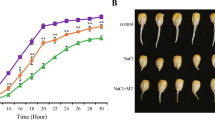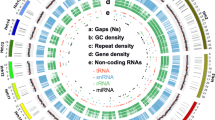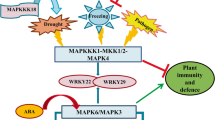Abstract
Key message
RNA-seq was used to analyze the transcriptional changes in sugar beet (Beta vulgaris L.) triggered by alkaline solution to elucidate the molecular mechanism underlying alkaline tolerance in sugar beet. Several differentially expressed genes related to stress tolerance were identified. Our results provide a valuable resource for the breeding of new germplasms with high alkaline tolerance.
Abstract
Alkalinity is a highly stressful environmental factor that limits plant growth and production. Sugar beet own the ability to acclimate to various abiotic stresses, especially salt and alkaline stress. Although substantial previous studies on response of sugar beet to saline stress has been conducted, the expressions of alkali-responsive genes in sugar beet have not been comprehensively investigated. In this study, we conducted transcriptome analysis of leaves in sugar beet seedlings treated with alkaline solutions for 0 day (control, C), 3 days (short-term alkaline treatment, ST) and 7 days (long-term alkaline treatment, LT). The clean reads were obtained and assembled into 25,507 unigenes. Among them, 975 and 383 differentially expressed genes (DEGs) were identified in the comparison groups ST_vs_C and LT_vs_C, respectively. Gene ontology (GO) analysis revealed that oxidation–reduction process and lipid metabolic process were the most enriched GO term among the DEGs in ST_vs_C and LT_vs_C, respectively. According to Kyoto Encyclopedia of Genes and Genomes pathway, carbon fixation in photosynthetic organisms pathway were significantly enriched under alkaline stress. Besides, expression level of genes encoding d-3-phosphoglycerate dehydrogenase 1, glutamyl-tRNA reductase 1, fatty acid hydroperoxide lyase, ethylene-insensitive protein 2, metal tolerance protein 11 and magnesium-chelatase subunit ChlI, etc., were significantly altered under alkaline stress. Additionally, among the DEGs, 136 were non-annotated genes and 24 occurred with differential alternative splicing. Our results provide a valuable resource on alkali-responsive genes and should benefit the improvement of alkaline stress tolerance in sugar beet.






Similar content being viewed by others
References
An YM, Song LL, Liu YR, Shu YJ, Guo CH (2016) De novo transcriptional analysis of alfalfa in response to saline-alkaline stress. Front Plant Sci 7:931. https://doi.org/10.3389/fpls.2016.00931
Bahieldin A et al (2015) RNA-Seq analysis of the wild barley (H. spontaneum) leaf transcriptome under salt stress. Comptes Rendus Biol 338:285–297. https://doi.org/10.1016/j.crvi.2015.03.010
Dohm JC, Holtgräwe D, Zakrzewski F, Tafer H, Rupp O, Stracke R, Reinhardt R (2014) The genome of the recently domesticated crop plant sugar beet (Beta vulgaris). Nature 505:546
Farhangi-Abriz S, Ghassemi-Golezani K (2018) How can salicylic acid and jasmonic acid mitigate salt toxicity in soybean plants? Ecotoxicol Environ Saf 147:1010–1016. https://doi.org/10.1016/j.ecoenv.2017.09.070
Flowers TJ, Colmer TD (2008) Salinity tolerance in halophytes. Blackwell Publishing Ltd., Weinheim
Frazee AC, Pertea G, Jaffe AE, Langmead B, Salzberg SL, Leek JT (2014) Flexible analysis of transcriptome assemblies with Ballgown. Ecotoxicol Environ Saf. https://doi.org/10.1101/003665
Gao P et al (2011) osa-MIR393: a salinity- and alkaline stress-related microRNA gene. Mol Biol Rep 38:237
Gong B, Wen D, Vandenlangenberg K, Wei M, Yang F, Shi Q, Wang X (2013) Comparative effects of NaCl and NaHCO 3 stress on photosynthetic parameters, nutrient metabolism, and the antioxidant system in tomato leaves. Sci Horticult 157:1–12
Gong B et al (2014) Sodic alkaline stress mitigation by interaction of nitric oxide and polyamines involves antioxidants and physiological strategies in Solanum lycopersicum. Free Radic Biol Med 71:36–48
Gu C-S, Liu L-Q, Deng Y-M, Zhang Y-X, Wang Z-Q, Yuan H-Y, Huang S-Z (2017) De novo characterization of the Iris lactea var. chinensis transcriptome and an analysis of genes under cadmium or lead exposure. Ecotoxicol Environ Saf 144:507–513. https://doi.org/10.1016/j.ecoenv.2017.06.071
Guerra D, Crosatti C, Khoshro HH, Mastrangelo AM, Mica E, Mazzucotelli E (2015) Post-transcriptional and post-translational regulations of drought and heat response in plants: a spider's web of mechanisms. Front Plant Sci 6:57
Guo R et al (2010) Effects of saline and alkaline stress on germination, seedling growth, and ion balance in wheat. Agron J 102:1252–1260. https://doi.org/10.2134/agronj2010.0022
Harrison MA (2012) Cross-talk between phytohormone signaling pathways under both optimal and stressful environmental conditions. In: Khan NA, Nazar R, Iqbal N, Anjum NA (eds) Phytohormones and abiotic stress tolerance in plants. Springer, Berlin, pp 49–76. https://doi.org/10.1007/978-3-642-25829-9_2
Hossain MS, ElSayed AI, Moore M, Dietz KJ (2017) Redox and reactive oxygen species network in acclimation for salinity tolerance in sugar beet. J Exp Bot 68:1283–1298. https://doi.org/10.1093/jxb/erx019
Kanehisa M et al (2008) KEGG for linking genomes to life and the environment. Nucleic Acids Res 36:D480–D484
Langmead B, Salzberg SL (2012) Fast gapped-read alignment with Bowtie 2. Nat Methods 9:357. https://doi.org/10.1038/nmeth.1923
Li H (2003) Principle and technology of plant physiology and biochemistry experiment. Higher Education Press, Beijing
Li H et al (2015) Salt stress response of membrane proteome of sugar beet monosomic addition line M14. J Proteomics 127:18–33. https://doi.org/10.1016/j.jprot.2015.03.025
Li N et al (2018) Transcriptome analysis of two contrasting rice cultivars during alkaline stress. Sci Rep 8:9586. https://doi.org/10.1038/s41598-018-27940-x
Liu Q, Tang J, Wang W, Zhang Y, Yuan H, Huang S (2018) Transcriptome analysis reveals complex response of the medicinal/ornamental halophyte Iris halophila Pall To high environmental salinity. Ecotoxicol Environ Saf 165:250–260. https://doi.org/10.1016/j.ecoenv.2018.09.003
Livak K, Schmittgen T (2001) Analysis of relative gene expression data using real-time quantitative PCR and the 2−ΔΔCT method. Method 25:402–408
Magaña C et al (2011) Direct prediction of bioethanol yield in sugar beet pulp using near infrared spectroscopy. Bioresour Technol 102:9542
Mutasa-Göttgens ES, Joshi A, Holmes HF, Hedden P, Göttgens B (2012) A new RNASeq-based reference transcriptome for sugar beet and its application in transcriptome-scale analysis of vernalization and gibberellin responses. BMC Genomics 13:99. https://doi.org/10.1186/1471-2164-13-99
Oelze ML, Vogel MO, Alsharafa K, Kahmann U, Viehhauser A, Maurino VG, Dietz KJ (2012) Efficient acclimation of the chloroplast antioxidant defence of Arabidopsis thaliana leaves in response to a 10- or 100-fold light increment and the possible involvement of retrograde signals. J Exp Bot 63:1297
Pertea M, Kim D, Pertea GM, Leek JT, Salzberg SL (2016) Transcript-level expression analysis of RNA-seq experiments with HISAT StringTie and Ballgown. Nat Protoc 11:1650. https://doi.org/10.1038/nprot.2016.095
Reddy A, Rogers M, Richardson D, Hamilton M, Ben-Hur A (2012) Deciphering the plant splicing code: experimental and computational approaches for predicting alternative splicing and splicing regulatory elements. Front Plant Sci. https://doi.org/10.3389/fpls.2012.00018
Shi D, Sheng Y (2005) Effect of various salt–alkaline mixed stress conditions on sunflower seedlings and analysis of their stress factors. Environ Exp Bot 54:8–21
Shi D, Wang D (2005) Effects of various salt-alkaline mixed stresses on Aneurolepidium chinense (Trin.) Kitag. Plant Soil 271:15–26
Shrivastava P, Kumar R (2015) Soil salinity: a serious environmental issue and plant growth promoting bacteria as one of the tools for its alleviation. Saudi J Biol Sci 22:123–131. https://doi.org/10.1016/j.sjbs.2014.12.001
Singh A (2015) Soil salinization and waterlogging: a threat to environment and agricultural sustainability. Ecol Indic 57:128–130. https://doi.org/10.1016/j.ecolind.2015.04.027
Siriwat W, Kalapanulak S, Suksangpanomrung M, Saithong T (2018) Unlocking conserved and diverged metabolic characteristics in cassava carbon assimilation via comparative genomics approach. Sci Rep 8:16593. https://doi.org/10.1038/s41598-018-34730-y
Staiger D, Brown JWS (2013) Alternative splicing at the intersection of biological timing, development, and stress responses. Plant Cell 25:3640–3656. https://doi.org/10.1105/tpc.113.113803
Trapnell C et al (2010) Transcript assembly and quantification by RNA-Seq reveals unannotated transcripts and isoform switching during cell differentiation. Nat Biotechnol 28:511–515
Troll W, Lindsley J (1955) A photometric method for the determination of proline. J biol chem 215:655–660
Turesson H, Andersson M, Marttila S, Thulin I, Hofvander P (2014) Starch biosynthetic genes and enzymes are expressed and active in the absence of starch accumulation in sugar beet tap-root. BMC Plant Biol 14:104–104. https://doi.org/10.1186/1471-2229-14-104
Vastarelli P, Moschella A, Pacifico D, Mandolino G (2013) Water stress in Beta vulgaris: osmotic adjustment response and gene expression analysis in ssp. vulgaris and maritima. Am J Plant Sci 4:11–16
Wakeel A, Hanstein S, Pitann B, Schubert S (2010) Hydrolytic and pumping activity of H+-ATPase from leaves of sugar beet (Beta vulgaris L.) as affected by salt stress. J Plant Physiol 167:725–731
Wang YX, Sun GR, Wang JB, Chen G, Cao WZ, Liu AP, Wang C (2007) Comparison of the effects of Na2CO3 and NaCl stresses on antioxidant enzymes of chloroplasts of Puccinellia tenuiflora seedlings. Acta Pratacult Sin 16:81–86
Win KT, Tanaka F, Okazaki K, Ohwaki Y (2018) The ACC deaminase expressing endophyte Pseudomonas spp. Enhances NaCl stress tolerance by reducing stress-related ethylene production, resulting in improved growth, photosynthetic performance, and ionic balance in tomato plants. Plant Physiol Biochem 127:599–607. https://doi.org/10.1016/j.plaphy.2018.04.038
Xu D, Do DT (2012) Genetic studies on saline and sodic tolerances in soybean. Breed Sci 61:559–565. https://doi.org/10.1270/jsbbs.61.559
Xu W, Jia L, Shi W, Baluska F, Kronzucker HJ, Liang J, Zhang J (2013) The tomato 14-3-3 protein TFT4 modulates H+ efflux, basipetal auxin transport, and the PKS5-J3 pathway in the root growth response to alkaline stress. Plant Physiol 163:1817–1828. https://doi.org/10.1104/pp.113.224758
Yang C, Chong J, Li C, Kim C, Shi D, Wang D (2007) Osmotic adjustment and ion balance traits of an alkali resistant halophyte Kochia sieversiana during adaptation to salt and alkali conditions. Plant Soil 294:263–276. https://doi.org/10.1007/s11104-007-9251-3
Yang Q et al (2009) Overexpression of SOS (Salt Overly Sensitive) genes increases salt tolerance in transgenic Arabidopsis. Mol Plant 2:22
Yang L, Ma C, Wang L, Chen S, Li H (2012) Salt stress induced proteome and transcriptome changes in sugar beet monosomic addition line M14. J Plant Physiol 169:839–850. https://doi.org/10.1016/j.jplph.2012.01.023
Yin Q-s, Yuan X, Jiang Y-g, Huang L-l, Li G-z, Hao L (2018) Salicylic acid-mediated alleviation in NO2 phytotoxicity correlated to increased expression levels of the genes related to photosynthesis and carbon metabolism in Arabidopsis. Environ Exp Bot 156:141–150. https://doi.org/10.1016/j.envexpbot.2018.09.010
Young MD, Wakefield MJ, Smyth GK, Alicia O (2010) Gene ontology analysis for RNA-seq: accounting for selection bias. Genome Biol 11:R14
Zhang Z (2004) Experimental guide of plant physiology. Higher Education Press, Beijing
Zhang JJ, Lu YC, Zhang SH, Lu FF, Yang H (2016) Identification of transcriptome involved in atrazine detoxification and degradation in alfalfa (Medicago sativa) exposed to realistic environmental contamination. Ecotoxicol Environ Saf 130:103–112. https://doi.org/10.1016/j.ecoenv.2016.04.009
Acknowledgement
This research was supported by National Natural Science Foundation of China (31671622) and Technical System of Sugar Industry of China (CARS-170201).
Author information
Authors and Affiliations
Contributions
CLZ, DL, PRW and CFL conceived the study. CLZ, YBW and CFL designed the sequence data sets. CLZ, and DL analyzed the data. CLZ, ZJG, LL, FFY and GHG drafted the manuscript. All the authors contributed to editing and revising the manuscript.
Corresponding author
Additional information
Publisher's Note
Springer Nature remains neutral with regard to jurisdictional claims in published maps and institutional affiliations.
Electronic supplementary material
Below is the link to the electronic supplementary material.
Rights and permissions
About this article
Cite this article
Zou, C., Liu, D., Wu, P. et al. Transcriptome analysis of sugar beet (Beta vulgaris L.) in response to alkaline stress. Plant Mol Biol 102, 645–657 (2020). https://doi.org/10.1007/s11103-020-00971-7
Received:
Accepted:
Published:
Issue Date:
DOI: https://doi.org/10.1007/s11103-020-00971-7




